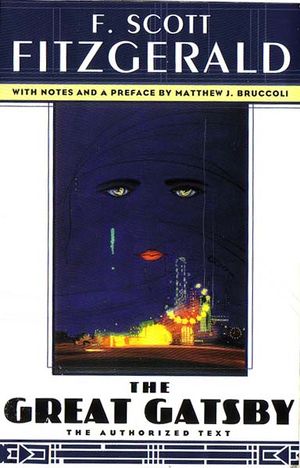The Great Gatsby
 From Conservapedia
From Conservapedia The Great Gatsby (1925) is considered one of the greatest novels of all time, and the finest work of American author F. Scott Fitzgerald. It depicts the "Roaring Twenties" or "Jazz Age" of the 1920s, which was a period of great prosperity in America just before the Great Depression.[1] This novel remains politically correct a century later, in contrast with other novels of the 20th century which used racial language considered inappropriate today. It is in the public domain now.
Fitzgerald was a fabulous romantic writer, as in this passage in the latter third of the book:
| “ | It was dawn now on Long Island and we went about opening the rest of the windows downstairs, filling the house with grey-turning, gold-turning light. The shadow of a tree fell abruptly across the dew and ghostly birds began to sing among the blue leaves. There was a slow, pleasant movement in the air, scarcely a wind, promising a cool, lovely day.
“I don’t think she ever loved him.” Gatsby turned around from a window and looked at me challengingly. “You must remember, old sport, she was very excited this afternoon. He told her those things in a way that frightened her—that made it look as if I was some kind of cheap sharper. And the result was she hardly knew what she was saying.” He sat down gloomily. “Of course she might have loved him just for a minute, when they were first married—and loved me more even then, do you see?”[2] |
” |
The Great Gatsby is a novel about Jay Gatsby, who was an ambitious American from the Midwest, just as Fitzgerald himself was. Gatsy seeks the American Dream and, unsuccessfully, the acceptance of high society along with it. "Jay Gatsby travels the journey to achieve the American dream, but his dream is corrupted and outside forces prevent him from ever fully attaining it."[3] Gatsby becomes a bootlegger during Prohibition, illegally selling liquor in his quest to impress Daisy Buchanan, a married, upper-class woman who had previously rejected him.
The story has conservative themes, including capitalism, charity, and fidelity based on love. The story is told sympathetically with respect to Gatsby's search for the love of Daisy. The narrator of the novel, Nick Carraway, is less sympathetic towards Daisy and others who flaunt their wealth.
The writing style is described as "wry, sophisticated, and elegiac, employing extended metaphors, figurative imagery and poetic language to create a sense of nostalgia and loss. The book can be read as an extended elegy, or poetic lament, for Gatsby."[4] It contains only 47,094 words was initially unsuccessful and was panned in its reviews:[5]
| “ | The book received some reviews that were dismissive ("f. scott fitzgerald’s latest a dud," a headline in the New York World ran) and others that were pleasant but patronizing. Fitzgerald later complained to his friend Edmund Wilson that “of all the reviews, even the most enthusiastic, not one had the slightest idea what the book was about. | ” |
It was not until after Fitzgerald's death that liberals began to promote the book, perhaps not realizing its underlying conservative message. To some, the novel is largely a tale of atheistic despair, as Gatsby clings to a love interest in his past. It also criticizes the heavily conservative government of the 1920s. It is a call to arms for the government to go barging into regulating business. It largely focuses on the negative aspects of what would become American conservatism.
But there is a deeper conservative message in the book, which may explain its enduring popularity as well as the initial resistance by liberal book reviewers. Jay Gatsby overachieves in order to seek the attention of his love interest, he is persistent, and he is charitable. He keeps trying and trying, without giving up, accomplishing more than others who were initially given far more.
There have been seven different movie adaptations of the novel, with Jay Gatsby portrayed by Robert Redford in 1974 and by Leonardo DiCaprio in the 2013 version. Even though the 2013 version received poor initial reviews, as the book itself did, it far outstripped predictions by garnering $144 million in box office receipts.[6]
References[edit]
- ↑ http://www.sparknotes.com/lit/gatsby/context.html
- ↑ https://www.gutenberg.org/cache/epub/64317/pg64317-images.html
- ↑ https://vc.bridgew.edu/undergrad_rev/vol7/iss1/22/
- ↑ https://www.mvorganizing.org/who-did-fitzgerald-write-screenplays-for/
- ↑ http://www.newyorker.com/magazine/2013/05/13/all-that-jazz-3
- ↑ http://www.boxofficemojo.com/people/chart/?id=leonardodicaprio.htm
Categories: [American Literature] [Books] [Novels] [Greatest Conservative Novels]
↧ Download as ZWI file | Last modified: 02/05/2023 11:38:45 | 13 views
☰ Source: https://www.conservapedia.com/The_Great_Gatsby | License: CC BY-SA 3.0
 ZWI signed:
ZWI signed:
 KSF
KSF